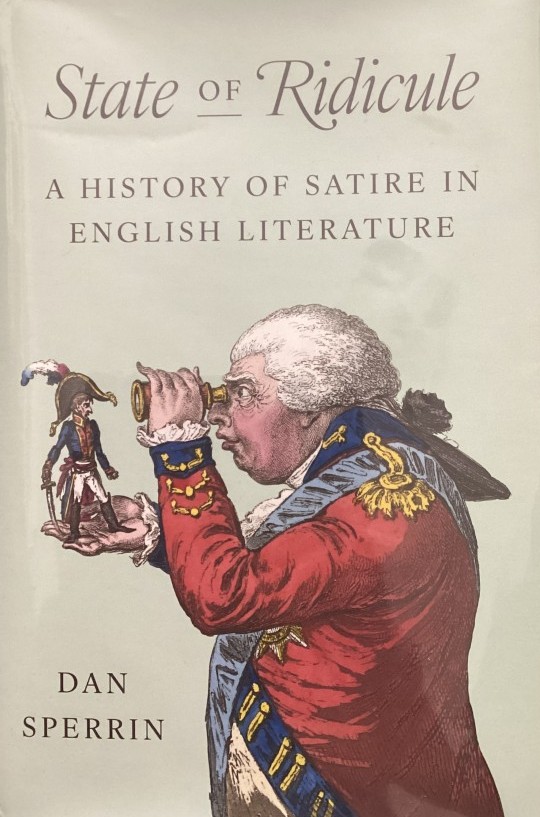Inspiring Older Readers
 posted on 11 May 2025
posted on 11 May 2025
State of Ridicule: A history of satire in English literature by Dan Sperrin
This is a huge book in every sense of that word: huge in ambition, huge in scholarship, huge in interest, huge in readability and even huge in size. It certainly doesn’t shy away from the massive challenge that the author has set for himself – an overview of the use of satire in English literature across the years from its Old English, Anglo-Saxon and Medieval roots through to the late 20th and early 21st centuries. But it’s even more ambitious than that because our starting point has to be the Classical world of Greece and Rome where the roots of satire in later English traditions lie: so, Sperrin takes us on an important excursion into the likes of Horace and Juvenal as an important bit of foundation laying.
Clearly the next thing that has to be confronted is a definition of what we mean by ‘satire’ and I suspect you won’t be surprised to discover that this is a pretty slippery thing to get hold of. Like most other literary genres, satire has mutated and evolved over time to fit the various needs of those using it. But I think it’s fair to say that what we most associate satire with is as a means of commenting upon and challenging powerful and established authorities or individuals – which is very much the emphasis that Sperrin puts on his analysis. As a consequence, in order to fully appreciate any satirical work, it has to be seen and understood in its historical context; this in turn means that a good proportion of this book digs deeply into some pretty complex historical and political events and relationships as well as setting out an interpretation of the way satire has been used in a specific text. And this, I think, makes the study more cohesive and thoroughly enjoyable as a long read.
The author, Dan Sperrin, we are told on the books flyleaf, ‘is research fellow in English at Trinity College, Cambridge, who specialises in literary and graphic satire of the long eighteenth century’ and so I wasn’t at all surprised to discover that the two lengthy chapters given over to Augustan satire are ones that really sparkle and come alive (which may be also something to do with my personal interest in this period that I’ve written about elsewhere on this site). His assessment of Dryden’s importance is fascinating and turns out to be much more complex than I’d previously appreciated and his analysis of Swift is very enjoyable – even if Swift comes out of it an even more bitter figure than I’ve seen painted before.
I think it’s probably to be expected that a literary form which has a primary goal of being critical of institutions or individuals who wield power, will attract people who want to disarm its influence and it has, of course, been the subject of repression and censorship. I was delighted to discover that the form of satire we perhaps most readily recognise today – the sort that comes with laughs – evolved precisely as a way of circumventing attempts to ban the more serious, direct political expressions of criticism.
The one criticism I’d have of the book is that the modern times are not dealt with in quite the depth I might have expected when compared with that given to the earlier manifestations of the genre. Satire from the mid-20th century onwards gets rather cursory attention in a somewhat truncated final chapter and I think that this is shame given the way it has found its way into the very many different modes of expression now available to it – especially, I think, in the world of graphic novels for example.
However, that niggle aside, this is a book I would heartly recommend to anyone with an interest in English literature and its wider role in social and political history. You may not sit down and, like me, read it from front to back but it is organised in such a way that it is possible to go into it where the interest takes you and find plenty there to stimulate and enthral.
Available now from Princeton University Press, you will be able to get a copy from your local independent bookshop – who will be happy to order you a copy if they don’t have it on their shelves.
Terry Potter
May 2025